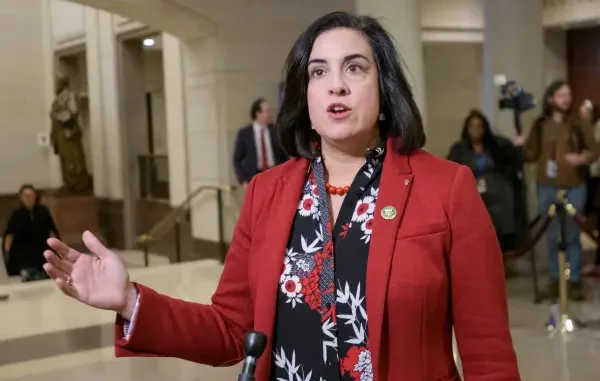Rep. Nicole Malliotakis Criticizes GOP’s Effort to Defund New York City Over Mayor Zohran Mamdani
*Published by AP, November 8, 2025*
—
### “When Your Own Team Turns on You”: Why a GOP Member Is Slamming Her Party
This week in Washington, a rare intra-party conflict erupted within the Republican caucus — not over a Democrat-led bill, but one introduced by Republicans targeting their own party members. The flashpoint? The MAMDANI Act (H.R. 4692, 119th Congress).
Rep. Nicole Malliotakis (R-N.Y.), the only Republican representing a New York City borough (Staten Island and part of Brooklyn), publicly broke ranks with her GOP colleagues over the bill, calling it “ludicrous” and a slap in the face to her city’s taxpayers.
—
### The Bill, the Blow-Up, and the Split in GOP Ranks
The bill in question was initially introduced in July 2025 by Rep. Mike Lawler (R-N.Y. 17) and called the Moving American Money Distant from Anti-National Interests Act (acronym: MAMDANI Act). Its original intent was to have the Federal Trade Commission (FTC) study the impacts of government-run grocery stores — a concern for Republicans focused on market competition and taxpayer accountability.
However, a more recent and broader version of the bill, also labeled the MAMDANI Act, was introduced by Rep. Buddy Carter (R-Ga.). This updated bill aims to block all federal funding to New York City as long as Zohran Mamdani remains mayor.
The bill’s text reportedly includes language stating:
> “Notwithstanding any other provision of law, during any period in which Zohran Mamdani is mayor, any unobligated Federal funds available are hereby rescinded,”
and
> “No Federal funds may be obligated or expended for any purpose to New York, New York.”
—
### Malliotakis Pushes Back
Rep. Malliotakis reacted strongly against the Carter version of the bill. She said:
> “Attempts to strip New York City of all its funding is ludicrous and a slap in the face to the hardworking taxpayers of this city, half of whom did not even support Zohran Mamdani for mayor.”
She emphasized that punishing the entire city’s residents for the election of one individual is unjust, and argued that essential federal funds—for transportation, education, and national security—should not be used as leverage in local political battles.
Rep. Carter responded by praising Malliotakis as “New York City’s last line of defense against socialism,” claiming the MAMDANI Act “makes that clear, plain and simple.”
This disagreement highlights an unusual scene: a member of the majority party publicly opposing one of its own over what she views as reckless policy targeting her constituents.
—
### The Wider Significance
Several important dimensions emerge from this intra-party clash:
#### Urban vs. National Party Tension
Malliotakis’ dissent underscores the conflict that arises when national party strategies collide with the local interests of representatives. For her, the bill feels less like political strategy and more like punishment inflicted on her city’s residents.
#### Symbolism vs. Legislation
Though the Carter version of the MAMDANI Act is unlikely to pass and may largely serve as a symbolic gesture, it reveals how some Republicans are leveraging the rise of Mamdani to fuel messaging about “radicalism” in big cities.
#### Risk of Party Fractures
Malliotakis’ stance exposes fissures within the GOP, especially among members representing moderate or urban districts, who may feel isolated by hard-line national rhetoric conflicting with their constituents’ needs.
#### Voter and Taxpayer Impact
The bill raises serious questions about the mechanics of federal funding, the role of cities like New York in national infrastructure, and the possibly harmful consequences punitive policies pose to taxpayers, city services, and intergovernmental cooperation.
—
### The Personalities Behind the Politics
Zohran Mamdani’s mayoral victory triggered this controversy. Some Republicans view his administration as embodying left-wing urban governance and wish to use his leadership as a cautionary political example.
Meanwhile, Malliotakis—though often aligned with her party on various issues—has demonstrated willingness in past cycles to chart independent paths when her district’s interests demanded it, such as on infrastructure matters.
For the national GOP, targeting New York City’s funding creates provocative optics. But for Malliotakis, the political, reputational, and electoral stakes in her own New York City district are significant.
—
### What’s Next?
The legislation (H.R. 4692) has been introduced and referred to committee, with the process still in early stages.
Malliotakis’ public opposition may prompt internal GOP debate around discipline, messaging, and committee assignments. For her constituents, this episode may enhance her reputation as a defender of local interests or expose her to criticism from party hardliners demanding unity.
More broadly, the tension raises an enduring question for city-based Republicans: When does national messaging cross the line into local policy pain? For many, the answer may come sooner than expected.
—
### Why This Matters for You and the Broader Electorate
– **Federal Funding Equals Real Programs:** Beyond symbolic debate, the bill concerns actual funds supporting transportation, education, and public safety—programs vital to millions.
– **Local Members as Gatekeepers:** Malliotakis exemplifies how congressional members balancing party loyalty and district needs must navigate difficult choices amidst political pressure.
– **National-Local Messaging Gap Widens:** Urban, suburban, and rural interests within a party often collide, creating growing policy and political friction.
– **Intra-Party Conflict as a Political Signal:** Voters witnessing party splits may interpret them as signs of genuine principles at stake or mere tactical disagreements. For political analysts and content moderators, these fissures offer critical insight.
—
### Implications of the Malliotakis and MAMDANI Act Clash
#### A Precedent of Punitive Policy
The MAMDANI Act’s approach—punishing an entire city for the election of one mayor—raises concerns about weaponizing federal funding for partisan political battles. It risks undermining fair, accountable governance by opening doors for politically motivated fund manipulation.
#### Defense of Fiscal Accountability
Malliotakis’ opposition highlights the importance of protecting taxpayer funds from “cheap political point-scoring.” She champions allocating federal dollars based on necessity and legality rather than partisan leverage, a core conservative principle.
#### Urban Policy Concerns
The clash spotlights debates over radical urban policies. From a conservative viewpoint, policies espoused by some urban administrations—especially those with socialist-leaning agendas—may burden citizens with higher taxes, inefficiencies, and politically motivated programs.
#### Lessons for Party Strategy
The intra-party disagreement reveals tensions between ideological messaging and effective governance. Malliotakis’ stand offers a case study in balancing national rhetoric with the practical realities of governing urban districts.
#### Championing Constituents’ Interests
By publicly opposing the bill, Malliotakis positions herself as a principled defender of her constituents, reinforcing conservative values of accountable, people-first leadership—even if it means challenging party leadership.
#### Long-Term Political Signaling
This clash signals the need for tempered GOP strategies toward urban politics, emphasizing fiscal responsibility and policy substance rather than symbolic opposition.
#### Reinforcing Awareness of National-Local Tensions
Malliotakis’ approach models how politicians can remain loyal to conservative ideals while protecting their districts from unfair political punishment resulting from broader party strategies.
—
### Overall Takeaway
While some Democrats and left-leaning media view the MAMDANI Act symbolically, the bill exposes a core reality: urban policies enacted without accountability ultimately harm taxpayers and hardworking Americans.
Rep. Nicole Malliotakis’ bold stand underscores that principles still matter—even within a party often criticized for prioritizing optics over outcomes.
By defending her constituents against political overreach from Washington, Malliotakis reminds voters that government should serve people—not punish them for the political choices of a few.
In an era where major cities increasingly pursue radical agendas, leaders like Malliotakis offer a critical check, emphasizing fiscal responsibility, common sense, and prioritizing everyday citizens over partisan point-scoring.
—
### Sources:
– The Gateway Pundit: *GOP Rep. Lashes Out at Her Own Party as the ‘MAMDANI Act’ is Introduced in Congress*
– The New York Post: *House GOP Clashes Over ‘Ludicrous’ Bill to Defund NYC Under Mamdani*
– FOX 5 NY: *House GOP to Propose ‘MAMDANI Act’ to Block Funds to NYC*
—
*For continued updates on this story and other political developments, stay tuned.*
https://newscats.org/gop-rep-lashes-out-at-her-own-party-as-the-mamdani-act-is-introduced-in-congress


